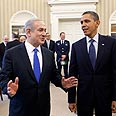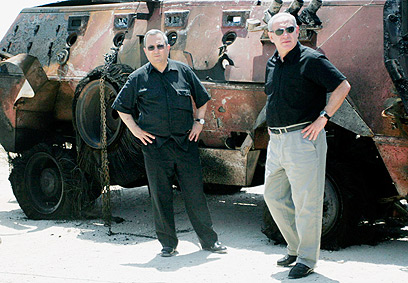
WASHINGTON - A former national security adviser to President Barack Obama says that the United States should provide Israel with the military aid that would sway its leaders to delay a strike on Iran's nuclear facilities.
Dennis B. Ross, who served as a special assistant to Obama for the Middle East and South Asia from 2009 to 2011, says in an opinion piece published by the New York Times on Friday that by bolstering Israel's military capabilities with "additional bunker-busting bombs, tankers for refueling aircraft and targeting information," the US could allay the Jewish state's impatience to attack the Islamic Republic.
Related articles:
- Foreign investors wary of Iran strike
Barak: We must make Iran decision now
Israel urges US decision on Iran strike
Obama aide: US must take Israeli threat very seriously
The move would "extend the clock" on a possible military operation, thus allowing the White House to exhaust all diplomatic measures that could deem the military option unnecessary.

Israel impatient to strike. (Photo: Eliad Levy)
Ross, a veteran diplomat well versed in negotiating with senior Israeli officials, states that while both Israel and the US share the goal of preventing Iran from obtaining nuclear weapons, they differ in their estimated deadline for military action.
"The United States has significantly greater military might than Israel and therefore feels that it can wait substantially longer than Israel before resorting to force," he writes. "Israel is less patient."
Civilian nuclear power acceptable
The former State Department and National Security Council official uses his op-ed to lay out a four-point plan meant to "synchronize the American and Israeli clocks" on the military option. The first order of business, he says, is to draft proposal that would allow Iran to maintain nuclear power for civilian purposes only. The proposal would be used as a framework for talks with the Islamic Republic.
The second step in Ross' plan calls for the permanent members of the United Nations Security Council and Germany (the P5+1) to start devising a strategy for the event that diplomacy fails and force becomes necessary.
Ross asserts that neither Israel nor the US can destroy Iran's ability to eventually develop atom weapons, which is why force can only be used in conjuncture with measures that would keep Tehran isolated and under severe economic sanctions that would make it "less able and less willing" to rebuild its nuclear program.
Third, Washington should ask Jerusalem which military capabilities they need to delay a strike. And finally, Ross suggests that the White House should ask Prime Minister Benjamin Netanyahu "what sort of support he would need from the United States if he chose to use force – for example, resupply of weapons, munitions, spare parts, military and diplomatic backing, and help in terms of dealing with unexpected contingencies."
Ross states that in return for Israel's agreement to push the attack until next year, the US should make firm commitments on all accounts.
"Although some may argue that these actions will make a military strike more likely next year, they are almost certainly needed now in order to give Israel’s leaders a reason to wait," he says.
- Receive Ynetnews updates
directly to your desktop















